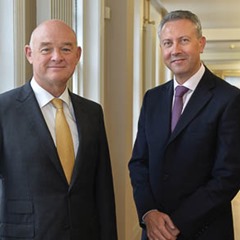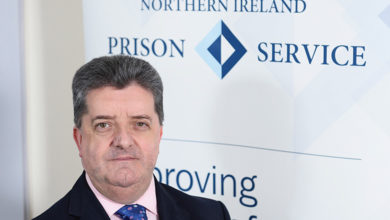The investment agenda
 Phoenix Natural Gas CEO Peter Dixon and Pinsent Masons’ Northern Ireland Head of Office Paul McBride discuss the recent acquisition of the natural gas network company by Hastings, the Australian infrastructure fund manager.
Phoenix Natural Gas CEO Peter Dixon and Pinsent Masons’ Northern Ireland Head of Office Paul McBride discuss the recent acquisition of the natural gas network company by Hastings, the Australian infrastructure fund manager.
The Australian utility investment fund Hastings has invested a reported £700 million in one of the biggest ever corporate deals seen in Northern Ireland.
“As an infrastructure manager they are totally focused on infrastructure, and have invested significant equity into the business,” observes Peter Dixon.
When asked what did Hastings see in Phoenix Natural Gas? Paul McBride, Pinsent Masons’ Northern Ireland Head of Office and Phoenix’s legal advisor, says: “It was a combination of well-established stable returns and the opportunity for growth.”
Dixon adds: “They saw something that was still immature enough to get growth from. A utility normally has most consumers using its product in its area of coverage, in our case that is Greater Belfast. Although we have extended the gas network to reach 92 per cent of people in our area only 53 per cent will be using natural gas by the end of 2013. In Great Britain 94 per cent of people have chosen gas when it has become available to them, which gives Phoenix great potential for future growth.”
Although recent unrest was a worry, Dixon says that the only concerns the Australian fund had were on the regulatory front: “We have seen some regulatory instability in the utility sector. If we had the same regulatory stability as seen in Great Britain that would help our future growth and would help make Northern Ireland more attractive to investors.”
Dixon sees Northern Ireland as a good place to invest, particularly at the present: “I was talking to a CEO of a services business who was looking to invest in Northern Ireland and he asked me what did he think would be their experience if they came and tied up a lot of equity in an outsourcing operation focused on public services?” Dixon replied that they would ask themselves why hadn’t they invested here 10 years ago.
McBride sees the Hastings-Phoenix deal, which was one of the largest corporate deals ever done in Northern Ireland, as an indication of the confidence in the local economy. As part of the due diligence for the purchase of Phoenix there was a thorough look at Northern Ireland as a place to invest.
“On the positive side they were satisfied that government here was functioning as it should be and the Executive should be congratulated for that. It was really a big tick against government, Northern Ireland’s available workforce and the need for natural gas here,” says Dixon.
Outside the Greater Belfast area less than 5 per cent of people have natural gas and the proposed expansion of the gas network to the west is seen as a positive move to secure the future of the sector. “It was extremely supportive to have the Executive promising the expansion of the natural gas network, particularly in light of recent negative publicity and television pictures of burning cars. By supporting gas to the west it is a vote of confidence in the future of the industry,” says Dixon.
 McBride observes that a transaction of this size with an international investor comes after four of the worst years for merger & acquisition activity in Northern Ireland which “is a great sign of confidence in Northern Ireland as a place to invest.”
McBride observes that a transaction of this size with an international investor comes after four of the worst years for merger & acquisition activity in Northern Ireland which “is a great sign of confidence in Northern Ireland as a place to invest.”
“M&A deals are a good barometer of economic activity and of business confidence. The deal could also act as a stimulus to other international investors looking at other quality assets in Northern Ireland,” adds McBride.
“With large companies like Phoenix or quasi-public assets we need to create the right culture of openness and ambition. Openness in terms of being willing to embrace international investment but also confidence and ambition in knowing that we have taken businesses to a certain point in their evolution or life journey where they are attractive to international investors,” observes McBride.
Dixon has a strong grasp of the structure of the local economy, leading an energy utility and distributing to all sectors. He observes: “We have a relatively small private sector with a handful of large organisations and mostly small businesses – we are a small business economy. Phoenix was a start-up with three people and there are now around 3,500 people employed in the natural gas sector here.
“Larger companies with an export focus have weathered the downturn well and have placed themselves on the world stage making themselves of interest to international investors. Phoenix is an example of this, attracting good quality equity investment,” reflects McBride.
“Another aspect is the challenge of the local debt market. It is now perhaps the time for some local businesses to look at alternative funds of finance.
“We are still in the situation where we have only three publicly quoted companies and in any ‘normalised’ economy of this size we would expect that to be between 40 and 50,” says McBride.
Pinsent Masons has worked closely with Phoenix’s management throughout the evolution of the company. This perhaps reflects the old adage that ‘you are your clients’. The type of service has evolved from a more traditional corporate legal support role to working in what is now a complex regulatory environment. McBride sees Pinsent Masons’ strength in being able to adapt and respond to client needs – it has the largest energy legal team in the UK. It is strong in the local legal market with an Irish Times survey highlighting the fact that the firm works for 33 per cent of large corporates in Northern Ireland.
With the Irish Republic’s economy now stabilising and some glimmers of growth in the UK economy, Dixon believes that Northern Ireland needs to make the most of any emerging opportunities.
McBride echoes this saying that it has taken time to build confidence in the devolved structures but now is the time to show that devolution does work. “There has been a continuing infrastructure deficit where we haven’t seen the firmness of decision making that was needed. Now is the time for that to change. The economic backdrop is improving and there are international investors willing to invest here as demonstrated by the Hastings-Phoenix deal,” says McBride.
In closing, Dixon emphasises that theme: “The opportunity is now. You can now say to people here are the six reasons for investing in Northern Ireland: we now have a stable government; we have a highly educated workforce; there has been an influx of financial services companies who are doing well; there is a growing technology sector, built on the back of some great infrastructure; we have seen some great deals such as the Hastings-Phoenix deal; and we have excellent support services.
“The Hastings-Phoenix deal is a great testament of confidence in Northern Ireland,” concludes Dixon.







